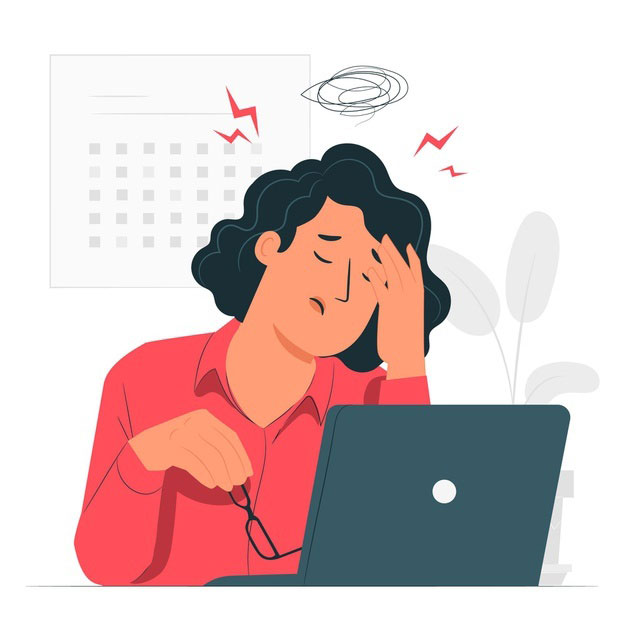Headaches and migraines are different from each other. A recurrent, chronic, and intensified headache is called a migraine. Depending on the type of migraine, the doctor may suggest different treatments with a professional approach.
Generally, the main symptom of migraine is an intense headache on one side of the head.
The pain is often controlled or excruciating tingling that is aggravated by movement and prevents you from performing normal activities.
In some cases, the pain can be on either side of the head and may affect your face or neck.
The symptoms associated with migraine often include:
- Headache
- Nausea
- Vomiting
- Increased sensitivity to light and sound
Sometimes other symptoms may occur in some individuals, including the following:
- Sweating
- Weak concentration
- Feeling extremely hot or very cold
- Stomach pain
- Diarrhea
Not all people with migraines have these additional symptoms, and some people experience them without a headache.
Migraine symptoms often last from four hours to three days, although fatigue can be felt for more than a week.

PRE-MIGRAINE SIGNALS
About one in three migraine sufferers experience short-term warning symptoms called pre-migraine forebodings. These include the following:
- Vision problems – such as seeing flickering light, skewed patterns, or blind spots
- Numbness or a pins-and-needles tingling feeling often starting in one hand and moving up to the arm before affecting your face, lips, and tongue
- Feeling dizzy or unbalanced
- Difficulty speaking
- Fainting
These symptoms may develop within five minutes to an hour. Some people have only a mild headache or no headache.
WHEN TO SEEK MEDICAL ADVICE FOR MIGRAINE?
You should contact your doctor if you experience recurrent or excruciating migraine symptoms that do not go away with the irregular use of over-the-counter pain relievers such as paracetamol.
Take care and do not take over-the-counter pain relievers as doing so can make the headaches more difficult to treat after a while.
If you continue to have frequent migraines (more than five times a month) despite being under control with medicines, you should make an appointment with your doctor so that you can take advantage of the prophylactic treatment for migraine.
You should immediately call an ambulance if you or any of your family members is aware of the following conditions:
- Paralysis or weakness on one side of one or both arms and/or face
- Slurred speech
- A sudden darkening, painful headache that has never been experienced before
- Headache with high temperature (fever)
- Mental disturbances,
- These symptoms can be signs of more serious problems such as stroke (paralysis) or meningitis and should be checked by a doctor as soon as possible.

TRIGGERS OF MIGRAINE
The exact cause of migraine is not known, although it is believed to be caused by short-term activity in nerve signals, chemicals, and blood cells in the brain.
It’s not clear what causes the changes in brain activity, but it’s possible that your genes trigger migraine attacks.
Several migraine triggers have been suggested, including hormonal, emotional, physical, dietary, environmental, and pharmacological factors.
These triggers are very specific, but keeping a diary can be helpful so that you can identify any recurring triggers. Sometimes it’s even hard to tell whether a cause is a real trigger or whether you’re just experiencing the early symptoms of a migraine attack.
HORMONAL TRIGGERS OF MIGRAINE
Some women get migraines in the days around their period, possibly due to changes in the levels of hormones such as estrogen.
Usually, these types of migraines occur two days before and three days after your period. Some women get migraines only around this time, which is called pure menstrual migraine. However, most women get it at other times as well and are called menstrual-related migraines.
Many women find that their migraines improve after their menses stop, although cessation of menstruation can exacerbate migraines or make them worse in some women.
EMOTIONAL TRIGGERS FOR MIGRAINE-
- Tension
- Curiosity
- Disappointment
- Excitement
PHYSICAL TRIGGERS OF MIGRAINE:
- Exhaustion
- Poor sleep
- Night shift work
- Neck or shoulder strain
- Jet lag
- Low blood sugar (hypoglycemia)
- Strenuous exercise, when you’re not used to it
DIET TRIGGERS FOR MIGRAINE:
- Missed, delayed, or irregular meals
- Dehydration (lack of water)
- Alcohol
- Food additive tyramine
- Caffeine products like tea and coffee
- Specific foods such as chocolate, citrus fruits, and cheese

ENVIRONMENTAL TRIGGERS FOR MIGRAINE:
- Shining light
- The twinkling of television or computer screen
- Smoking (or smoky rooms)
- Excessive noise
- Climate change such as changes in humidity or extremely cold temperatures
- Pungent smell
- Stuffy atmosphere
MEDICINES :
- Certain types of sleeping pills
- Combined contraceptive pill
- Hormone replacement therapy (HRT), which is sometimes used to relieve symptoms after menses has stopped
Now that you know about the triggers and warning signals of migraine, get started with migraine therapy at the Zenith Injury Relief and Wellness Clinic, which will boost your recovery from chronic and recurrent headache.
